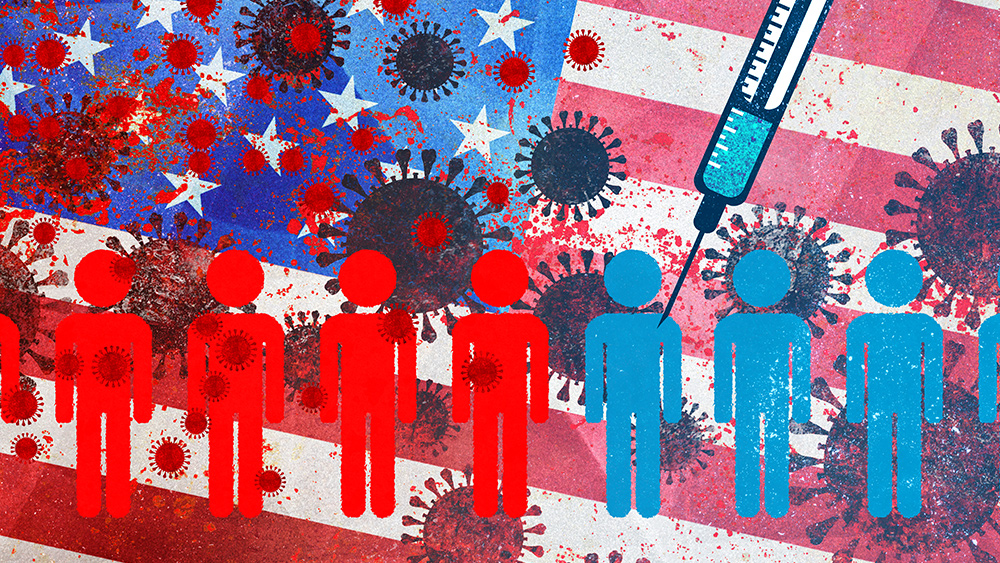Social experiments demonstrate blind obedience to authority
11/05/2021 / By Mary Villareal

Governments and the pharmaceutical industry have been brazenly pushing experimental drugs to solve the Wuhan coronavirus (COVID-19) pandemic. Interestingly, many people are rushing to participate in the mandates, edicts and orders in a way that supports coercion and segregation of people who do not wish to put unproven chemicals in their bodies.
Conformity and blind obedience to authority have been going on for a long time. Here are a few social experiments that demonstrate this:
The Asch conformity experiments – Solomon Asch conducted a series of group psychology experiments in the 1950s that showed how easily people will go against evidence they see with their own eyes.
Participants in this experiment were asked to look at a picture of simple lines and declare which one appears closest in length to a control sample. While the correct answer is obvious, the majority of participants answered incorrectly as they followed a group that deliberately gave the incorrect answer.
This is a riveting example of the power of groupthink, reminding people that they are wired to adhere to norms, even if it is beyond logical reasoning. (Related: Americans no longer buying government propaganda, deception and lies about COVID-19 vaccines.)
Dangerous conformity – People are hard-wired for social conformity, even when it may present an immediate danger to their safety. This is a well-known phenomenon and is effectively illustrated in a social experiment overseen by Dominic Abrams, a psychology professor who attempted to answer whether or not individuals in a burning room would sit by just because everyone else is.
In this experiment, participants shockingly ignored evidence of their senses and waited for the group to lead the way. In a real-life situation, this would have cost them their lives.
Deferring responsibility to perceived authority figures – A popular social experiment by Stanley Milgram in 1961 showed obedience to authority, serving as a milestone in how the understanding of people’s ethics can drastically change when responsibility for their actions is deferred to an authority figure.
Intrigued by the role of Nazi officers in concentration camps, Milgram wanted to know how much coercion people needed to willfully inflict harm on another. He found that people are unable to think for themselves when given a subordinate role in an authoritarian hierarchy, such as those in a state-controlled world. Their natural and unconscious reaction is to defer the responsibility for their actions to someone of authority, relieving themselves of guilt.
Parroting ideas from mainstream media
The above ideas show how the human mind pursues conformity over rationality in circumstances where group pressure or pressure from authority is applied. People are hardwired for social conformity, making it one of the most dangerous aspects of humanity.
There is a clear science as to why things like this happen, and how the subconscious mind assesses safety among its tribe. By mitigating the dangers of being ousted by a group, people tend to defy logic in favor of conformity.
Those who engage in self-sabotaging and self-defeating behavior leave their minds open to be unconsciously manipulated by propagandists, media and the government.
Research has shown that when times are uncertain or threatening, people adapt their behavior according to what those around them say or do. Thanks to the social nature of humans, we accept new social rules if others around us do so, creating a tricky, circular problem where nobody wants to be the outlier.
Humans are social, but how they socialize vary. Bonds that link them to families and friends or a deep loyalty to authorities or their country can significantly affect their behavior.
Psychiatry.news has more on psychology and social behavior.
Sources include:
Tagged Under: big government, coercion, conformity, conspiracy, deception, groupthink, lies, mainstream media, Mind, mind control, obey, propaganda, Psychology, research, social behavior, social experiments
RECENT NEWS & ARTICLES
COPYRIGHT © 2017 OBEY NEWS




















